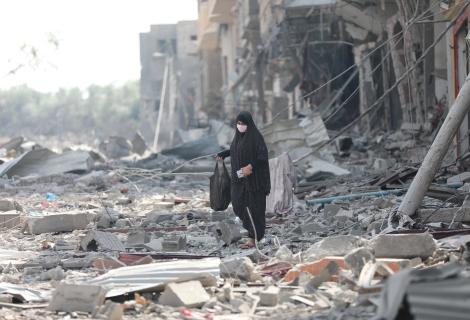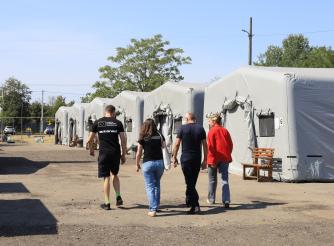UN council can only restore faith in its systems if it heeds Palestinian women’s rights

by Riham Jafari - Advocacy and Communications Coordinator at ActionAid Palestine
Within the UN Security Council is a crucial resolution that protects the rights of women all over the world – except those in Palestine.
The United Nations Security Council Resolution 1325 (UNSCR 1325) was adopted in 2000 to recognize the disproportionate impact of war and conflicts on women. It calls for the protection of women, preventing violence against them, and increasing their participation in peace processes, negotiations, and conflict resolution during war and conflict.
This key resolution, however, does not include Palestinian women. And although it attributes conflicts in different parts of the world to racial, religious and ethnic disputes, it does not mention women under military colonial occupation as is the case in the occupied Palestinian territory.
The question on our mind as member states gather at the annual open discussion at The Security Council for the advancement of the Women, Peace and Security Agenda this October is whether the international community will hear Palestinian women’s voices and consider their suffering.
In the 23 years since it was adopted, UNSCR 1325 has not brought hope to Palestinian women as it lacks any mechanism of implementation and accountability. The international community has failed to hold the Israeli occupation accountable for potential breaches of international humanitarian law and human rights violations committed against Palestinian civilians, including women, failed to achieve justice, secure protection and respect human rights. Since 2021, the International Criminal Court has been investigating allegations of war crimes and other breaches committed in the occupied Palestinian territory since June 2014. However, Israel does not recognise the court.
As a result of this failure to act, violence and breaches of international humanitarian law continue to threaten not only Palestinian women but also the Middle East and the world. Palestinian women are concerned about what they see as double standards - the implementation of the resolution in other countries but not in Palestine. In the period1967-2020, the US has vetoed 44 UNSC resolutions related to Israel. With Israel’s continuous violations of international law and the Geneva conventions, the US financial and military support to Israel in addition to US’s regular vetoes of Security Council resolutions on the Israeli-Palestinian conflict, it is hard to see hope for Palestinian women. On Monday, the UNSC failed to adopt a resolution that would have called for a humanitarian ceasefire in Gaza following the latest escalation.
As an occupying power, Israel must abide by its legal obligations and must be held accountable for current and past violations, rather than being offered a blank cheque of impunity. Article 11 of UNSCR 1325 calls against offering immunity to perpetrators of war crimes. In the current escalation in Gaza, women and children make up more than 60 percent of those killed. In the killing of Palestinian-American Journalist Shireen Abu Akleh, there was no action taken despite there being evidence of an extrajudicial killing.
As most European countries and the US stay silent, Israel continues violating UNSCR 1325 in Palestine through women and youth arrests, killings, raiding of cities and refugee camps and demolition of houses for Israeli takeover. Palestinians must also contend with land confiscation, an apartheid wall, withdrawal of permanent residency from Jerusalem residents, and the imposition of an illegal blockade on the Gaza strip for 17 years. These actions have a direct impact on women, contributing to disintegration of the social fabric, deterioration of economic and social conditions, often causing stress and trauma.
Without tools and resources and movement restrictions, women in Palestine are not equipped to respond to crises, including climate change. They also lose their livelihoods as they are forced out of land. Women’s right to engage within civil society is curtailed as some Palestinian human rights and women organizations such as the Union of Palestinian Women’s Committees are branded terrorist groups.
Despite this resolution, calling for the state to ensure protection for its women against gender-based violence (GBV), Palestinian women exposed to GBV pay a high price due to an ineffective legal system in the West Bank and Gaza Strip. The delay of Palestinian parliamentary elections, absence of a Palestinian legislative council and internal political division between the two major forces, contribute to the failure of this legal system. Without an effective legal system, tribal law and outdated legislations are enforced.
However, Palestinian activists should acknowledge the importance of this resolution since it allowed Palestinian women to build coalitions, design national actions plan, document abuses and raise awareness of the local and international community on violence against women.
Throughout Palestine’s history, the leadership and participation of Palestinian women in the national struggle for justice, liberation and freedom has been celebrated world over. But, this rich history of women’s activism is not being reflected in the recent peace process due to the underrepresentation of women.
Palestinian women should be supported to actively participate in political processes, including technical and political teams, and engage in reconciliation at the national level. This engagement is essential for strengthening Palestinian unity and promoting hope as the nation works towards achieving independence. This way we will ensure women leaders will continue playing a great role in establishing a just, resilient and democratic country.
Protecting and respecting the rights of Palestinian people will certainly achieve and advance peace and security for Palestinian women. Palestinian women urgently demand the UN and UNSC member states to have a special resolution addressing their status under military occupation, the root causes of their suffering, and the major obstacles impeding their participation and advancement of the women, peace and security agenda.


